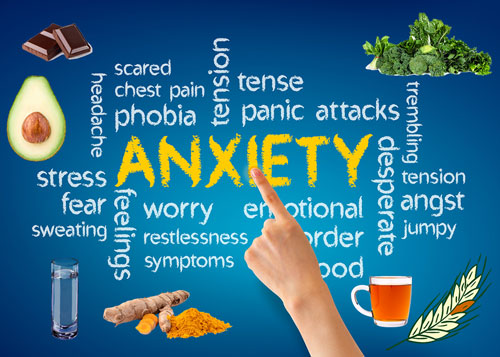7 Foods That Reduce Anxiety and Why They Work
Many factors in your life can contribute to anxiety.
A stressful job, money worries and family conflicts make it hard to switch off your stress response system.
Add to that unresolved issues from the past, perhaps as far back as your childhood, and you may well feel low-level anxiety almost all the time.
And just one setback, uncertainty, or conflict can trigger an episode of intense anxiety, or even a panic attack.
Anxiety is usually treated with counseling and psychotherapy, and in more severe cases with medication.
But there are other ways to help regulate the stress response in your central nervous system and to be able to initiate the relaxation response and restore your energy balance.
One of these ways is through diet.
While it may not entirely be true that you are what you eat, what you eat can have a significant impact on your mood and well-being.
Here are 7 foods that reduce anxiety and the reasons why they work.
1. Chocolate
Let’s just put chocolate first.
Chocolate is such a wonderful food that even thinking about it can improve your mood.
Eating it, of course, works even better!
The best chocolate for this purpose is dark chocolate (70% cacao or more).
Added sugar can have the opposite effect of making you more anxious.
Chocolate directly fights anxiety by reducing cortisol, one of the most powerful stress hormones.
Chocolate also contains large amounts of tryptophan, an amino acid that helps the neurotransmitters in your brain to elevate serotonin levels.
2. Avocados
Another boost for your neurotransmitters through high levels of B vitamins and monounsaturated fats.
Potassium in avocados lowers your blood pressure, and low potassium levels can cause fatigue, stress, and anxiety.
3. Chamomile Tea
While perhaps not everybody’s favorite, chamomile tea has a proven track record over many centuries to calm people down and even induce healthy sleep.
The hydroxylases in chamomile flowers relax your blood vessels and smooth your muscle fibers, helping to start the relaxation response by signaling to your system that all is well and quiet. Time to forget your troubles and let it all go.
Chamomile was your grandmother’s secret for quiet happiness. Make it your own!
4. Turmeric
Turmeric, a spice used mostly in Indian cooking, that your grandmother might have been less familiar with unless she had roots in Indian culture, contains curcuminoids, antioxidants that are neuroprotective and can contribute to stabilizing your mood.
Clinical trials have proven turmeric to be effective in the supportive treatment of depression.
5. Leafy Greens
Big leafy greens like spinach and Swiss chard provide high levels of magnesium.
Magnesium can calm the nervous system and help regulate the axis between the brain and the production of stress-related hormones.
6. Whole Grains
Whole grains are rich in both magnesium and tryptophan, both of which have a calming and mood elevating effect.
But make sure you get true whole grains, not products that contain any kind of processed food.
7. Water
And finally, there’s the most important substance you can take to prevent anxiety and panic attacks – water!
Staying hydrated is the key to maintaining energy levels and regulating your moods. The latest recommendation is that we drink half of our body weight in ounces of water. So if you weigh 140 pounds, you should be drinking 70 ounces of water per day.
Dehydration can trigger anxiety and it can take a long time to return your system to a healthy balance. If you wait until you feel thirsty, you are already dehydrated.
Food alone may not be enough to treat your anxiety, but a diet rich in calming substances will, over time, help your central nervous system to get back to balance.
The care and nurturing you put into the selection and preparation of your food is a big step towards overall self-care.
Self-care is the long term answer to balanced and well-adjusted emotions.
Take the first step…
If you are ready to address the anxiety that is holding you back in life, I would like to help. Please contact me via voicemail or email so we can discuss how we might work together to achieve your therapeutic goals as quickly and effectively as possible.
I look forward to hearing from you.
Linda K. Laffey, MFT


